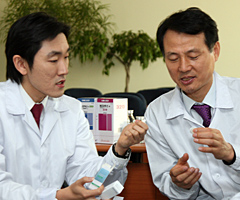Pharmaceutical Company Faces Challenges Due to Regulatory Restrictions in South Korea

Despite developing a groundbreaking treatment for glaucoma, Taejun Pharmaceutical (태준제약) is struggling to capitalize on its success due to stringent regulations in the Seoul metropolitan area. Choi Eun-young (최은영), the company's executive director, expressed her frustration, stating, "While Europe is eager to purchase our innovative therapy, we lack the facilities to produce it. It's incredibly frustrating."
Founded in 1978, Taejun Pharmaceutical specializes in ophthalmic medications and achieved a significant milestone in 2005 by investing 10 billion KRW to develop a glaucoma treatment. By 2008, the company had received certification from the European Union and approval for sales in Europe, marking a historic first for the domestic pharmaceutical industry in exporting complex ophthalmic drugs. However, the joy was short-lived.
The company's factory, located in Yongin, Gyeonggi Province, was classified as a semi-agricultural area when it was built. In 2002, it was reclassified as a natural green area, which prohibited any expansion of the facility. A company representative lamented, "We were designated as a regulated area without even a proper site inspection."
Choi noted, "We developed advanced technology and received EU certification, but the government has not permitted us to build a production facility, leaving us disheartened. We felt powerless." This situation led to increased costs due to order cancellations and outsourcing, resulting in a loss of 45 billion KRW over three years.
"We may not be experts in law, but it seems absurd that we can't produce goods despite having export opportunities due to regulations. We invested tens of billions in wastewater treatment facilities to ensure our discharge is cleaner than the surrounding rivers, yet we are still deemed a source of environmental pollution. It drove us to the brink of madness," she added.
In response to ongoing losses, Taejun Pharmaceutical submitted a petition for regulatory reform to the Gyeonggi Provincial Government in May 2008. The day after the petition was filed, a representative from the relevant department visited the company to assess the working conditions and challenges.
Following this, Gyeonggi Province and Taejun Pharmaceutical began collaborating on wastewater treatment technology development and manufacturing process remodeling to address regulatory issues. In August 2009, they approached three ministries—Ministry of Land, Infrastructure and Transport, Ministry of Environment, and Ministry of Knowledge Economy—to propose amendments to the Special Measures Act for Easing Business Activity Regulations.
During this period, Taejun Pharmaceutical successfully demonstrated the safety of its factory operations through rigorous inspections by the German Federal Institute for Drugs and Medical Devices. Consequently, various central government departments began granting approvals for factory expansion. Finally, in April 2010, Taejun Pharmaceutical received final approval for its factory expansion.
Reflecting on the visit from the regulatory team, Choi remarked, "I was surprised by their meticulousness, almost as if they were employees. With drug approvals from over ten countries, including France, Italy, and Denmark, we anticipate that once mass production is established, our sales will increase by over 60 billion KRW."
The issue of excessive regulation is not limited to small companies; even large corporations like Hynix Semiconductor (하이닉스반도체) face similar challenges. In February 2009, Hynix developed the world's first 40-nanometer semiconductor process, but its factory in Icheon was restricted from discharging copper, classified as a harmful substance, due to its location in a special water quality preservation area. As a result, the government denied the expansion of the Icheon plant.
According to Gyeonggi Province's investigation, the concentration of copper discharged by Hynix was below 8 parts per billion, comparable to the amount found in the waste of about 130 pigs.
Hynix Semiconductor's executive director, Jeong Yoon-young (정윤영), expressed his frustration, stating, "The wastewater discharged from our Icheon plant is treated through advanced facilities to maintain clean water quality. Yet, we are still denied expansion. The semiconductor industry is highly competitive, and failing to apply advanced technology in our processes affects our competitiveness."
In response, Gyeonggi Province undertook extensive efforts over four years, including ten public forums, 32 visits to the Blue House and central ministries, and 27 public hearings and discussions to advocate for Hynix's factory expansion. As a result, on February 24 of this year, the Ministry of Environment finally issued a notice allowing Hynix Semiconductor to proceed with its copper process and factory expansion.
Jeong stated, "This case exemplifies how continuous communication among the provincial government, businesses, and civic groups can effectively resolve regulatory issues in the metropolitan area."
According to Gyeonggi Province, during the fourth term of the elected government, easing regulations in the metropolitan area attracted investments totaling 50.5772 trillion KRW, leading to factory expansions and the creation of 100,000 jobs. Additionally, the removal of protective zones, including green belts and military areas, has made it possible for universities and factories to relocate and expand, benefiting over 60,000 individuals.
Park Soo-young (박수영), the head of the Competitiveness Enhancement Office in Gyeonggi Province, remarked, "Since the fourth term began, regulations in the metropolitan area have been relaxed to a revolutionary extent, driving corporate investment and contributing to economic recovery. These regulations not only inconvenience businesses but also local residents. We will continue to strive to eliminate unreasonable overlapping regulations that hinder corporate investment for the welfare of our citizens."
To address overlapping regulations, Gyeonggi Province has deployed a 'Regulatory Reform Task Force' across 61 agencies and expanded its dedicated regulatory reform department, operating three teams within the Competitiveness Enhancement Office.
What do you think?
0 reactions





